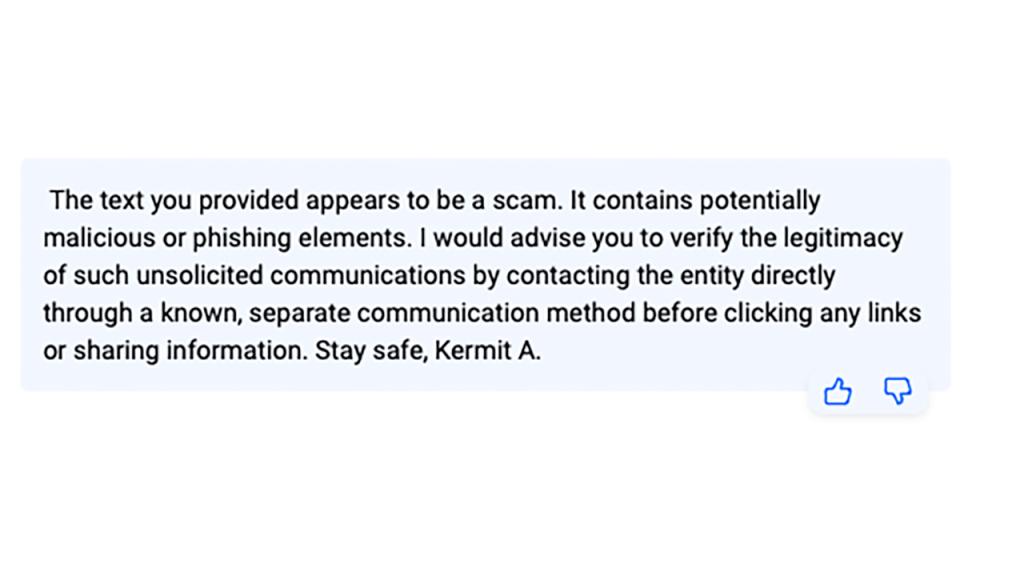What is it?
A Free (with signup) chatbot that analyses messages for potential scams
Like
Anything that help quell scams is conceptually good
Easy to use
Free
No Like
Requires signup and therefore gets your email address
Need to be careful with personal information in screenshots or submitted text
Spruiks Bitdefender services as part of its offering
Who decided “Scamio” was a good name for an anti-scam service?
Scams are a serious problem for many Australians. According to the latest Scamwatch figures, Australians have lost at least $455,436,239 to scammers in calendar 2023 alone, though that figure is almost certainly lower than the real figure, at least partially due to the way that shame often masks and hides the activities of online scammers.
So when a press release from cybersecurity firm Bitdefender landed in my inbox promising a way for ordinary consumers to detect scams using AI, I was intrigued… but cautious.
Cautious, because AI is absolutely one of those tech industry buzzwords that just about any product is likely to slap on their product whether it makes sense or not. It can only be a matter of time before I head to a supermarket to discover it’s selling AI-enhanced cheese, really.
So naturally, having written that sentence, I had to look it up, and AI-enhanced cheese is totally a thing now, because OF COURSE IT IS. But I’m digressing. Back to to the review…
But also cautious because, for some reason, Bitdefender decided to call its Anti-Scam AI chatbot service “Scamio”. It 100% suggests that it’s actually a Futurama-derived robot built for the purposes of scamming, and that’s not a smart marketing move.
The last thing you want is for somebody nervous about scams trying to figure out if they can trust your service in the first place. I mean, “Bitdefender Anti-Scam Detecting AI Chatbot” is a little harder to roll off the tongue, but it’s nicely descriptive of what the service is while presenting a degree of authority as well.
Odd naming aside, Scamio is primarily web-based at launch, with Facebook Messenger integration already built in and the promise of WhatsApp and Telegam integration “coming soon”.
It is free to use, which is always nice, though it does require you to enter an email address and create a login. Oddly, there is a verification step here, but it’s clearly just a regular Bitdefender account registration, because you can step straight through to Scamio without having to actually click on the verification link.
If you’re concerned about email privacy and companies having your address, well… that’s what burner email accounts were invented for, people.
The actual Scamio Chatbot interface is pretty much identical to any other service chatbot you’re likely to have encountered, with obviously a stronger focus on getting you to provide details of the scam attempt you’re concerned about. Scamio can analyse emails, text messages, images, individual links or QR codes, so the first thing I had to do was sort out some reasonable quick testing material.
Thankfully, I inhabit a place called “The Internet”, so that really wasn’t very hard at all; a quick trawl through the junk folder in my email and a check of the SMS scams I’ve received this week gave me plenty of material to work with.
Scamio’s approach to the rather-obvious scams was decent, though I’m not 100% sold on its advice entirely. Take for example this scam, which couldn’t much more obviously be a scam if it ran through my office naked with HI THERE I’M A SCAM painted across its chest while “SCAMMY DAYS ARE HERE AGAIN” blared out over loudspeakers as cheerleaders chanted out S-C-A-M with synchronised dancing:

Here’s what Scamio made of that one:

It’s good that Scamio recognises that it’s a scam, but the advice to “verify the legitimacy of such unsolicited communications by contacting the entity directly through a known, separate communication method before clicking any links or sharing information” shouldn’t really apply here.
For a message that’s pretending to be from your bank, the government or whatever, then checking through a different communication method is absolutely the right play in that situation.
But this is an entirely unsolicited wacky scamming email, so I’m left unsure how I’d contact the mystery scammer – and quite sure that I shouldn’t even try. I get that Scamio has to be somewhat generic here, but this could lead the unsuspecting into further investigating a scam thinking it might be real – and that’s not ideal.
Otherwise, Scamio’s advice was mostly solid, and it did a fine job of picking out the scams from the other content – mostly press releases, because I wanted longer text with images in it that were trying to sound authoritative.
It did fall over with some of the dodgy claims made in some junky emails I’d received trying to sell me on a suspiciously cheap smartphone lens that promised I would be able to watch and photograph people from any phone at up to 3.5 miles away. That’s a selling scam – the product is, without doubt, going to be rubbish – but I guess it is outside the more financial scope of what Scamio is looking for.
You would also want to be careful about the precise nature of material uploaded to Scamio. It did note early on in my test chat that:
“Please keep in mind that I do not have the ability to assess, access or retrieve personal data you have submitted. My design prioritizes user privacy and security, and when analyzing the submitted personal data such as email addresses, names or phone numbers, I can asses only those threats that are included in Bitdefender’s database of known security threats.”
However, it’s also a learning AI that has a rather prominent disclaimer that
“Scamio is an AI chatbot in an early access phase, designed to provide helpful information and guidance on avoiding scams and fake messages. By continuously learning and improving, Scamio offers more accurate advice over time.”
What is it going to learn from?
The content that users upload. It also, rather predictably, wanted to tell me about other Bitdefender products and services as a chat option. I suppose I can’t blame Bitdefender for wanting to keep the lights on and all, but some might find that irksome.
Ultimately, while the name of the product is just plain weird, I can see the appeal here, and honestly any tool that can help someone – even if it’s just one person – is a step in the right direction.
It would be lovely to think that services like Scamio aren’t needed – and they’re certainly just one tool in the arsenal fighting against scams, if you want specifically Australian resources check out what Scamwatch has to say as a good starter – but then I look back at that $455,436,239 figure for 2023 and realise that this is a fight that’s very much not over – and probably never will be.
We need all the weapons we can get.
